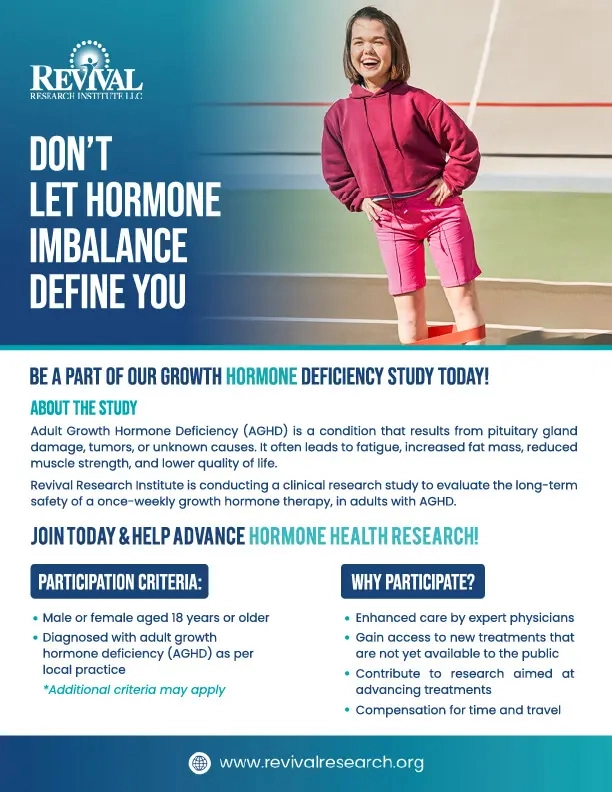Living with Adult Growth Hormone Deficiency?
Discover a Path to Wellness Through Clinical Trials
Adult Growth Hormone Deficiency (AGHD) is a rare but serious condition characterized by the inadequate secretion of growth hormone (GH) in adults. This can lead to increased body fat, decreased muscle mass, reduced bone density, and diminished quality of life. Unlike growth hormone deficiency in children, which affects development, AGHD primarily impacts physical function and metabolic health in adults.
AGHD typically occurs due to damage to the pituitary gland, which may result from tumors, surgery, traumatic brain injury, or unknown (idiopathic) causes. These hormonal imbalances not only impact physical health but can also affect emotional well-being and daily function.
If you or someone you know has adult growth hormone deficiency, Revival Research Institute is conducting Adult Growth Hormone Deficiency Clinical Trials, investigating potential new treatment options.
Is this Clinical Trial the Right Fit for You?
To qualify for the Adult Growth Hormone Deficiency Clinical Trials, participants must:
- Be male or female, 18 years or older
- Have been diagnosed with adult growth hormone deficiency (AGHD) as per local practice
*Additional criteria may apply.
Participation in the Adult Growth Hormone Deficiency Clinical Trials is free of cost. To learn more or enroll, fill out the form below, and someone from our research team will contact you to discuss your potential eligibility for the study.

About Adult Growth Hormone Deficiency Clinical Trials
Living with adult growth hormone deficiency (AGHD) can take a real toll on your daily life. It can lead to persistent fatigue, increased body fat, reduced muscle mass, and low energy levels, all of which affect one’s overall well-being.
Revival Research Institute is conducting a clinical trial to evaluate the safety and effectiveness of an investigational growth hormone treatment for adults diagnosed with AGHD. The study aims to explore whether this treatment can improve energy levels, physical function, and overall health.
The trial is being conducted at multiple sites across the United States, including locations in Texas. To participate, individuals must complete a screening process and agree to follow all study procedures. Eligible participants will be randomly assigned to receive either the investigational treatment or a placebo.
*All study-related procedures and treatments are provided at no cost. No insurance is required to participate, and eligible participants may receive compensation for time and travel.
Get Started
What to Expect?
If you’re living with AGHD, you may qualify for a paid clinical trial exploring new treatment options. After submitting the interest form above, a member of our research team will contact you for a brief pre-screening to determine if you meet the initial eligibility criteria.
If you qualify, you’ll be asked to review and sign an Informed Consent Form (ICF), which outlines all study procedures, potential benefits, and possible risks. Once consent is given, you will be invited to one of Revival’s research sites in Texas for a screening visit. During this visit, we’ll review your medical history, conduct physical exams, and perform lab tests to confirm your eligibility. Participants who meet all study requirements will be enrolled in the Adult Growth Hormone Disorder Clinical Trial.
Our team is committed to ensuring you fully understand your role in the study and what to expect throughout. Please don’t hesitate to ask questions before making your decision. Your involvement helps advance future treatment options for adult growth hormone deficiency.
Age
Condition
Location
Understanding Adult Growth Hormone Deficiency

Adult Growth Hormone Deficiency (AGHD) is caused by insufficient production of growth hormone in adults. It may be due to pituitary tumors, brain injury, surgery, radiation, or autoimmune inflammation. Some cases have no clear cause and are considered idiopathic (unknown). The condition may also lead to increased insulin resistance, impaired emotional well-being, and decreased quality of sleep.
Commonly affected functions include metabolism, muscle development, energy production, and mental focus. AGHD can contribute to long-term complications like cardiovascular disease and reduced bone strength if left untreated. Over time, individuals may also notice difficulty concentrating, reduced endurance, and slower recovery after physical activity.
Adult Growth Hormone Deficiency May Be Caused By
- Pituitary tumors or surgery
- Traumatic brain injury
- Radiation therapy
- Autoimmune inflammation
- Idiopathic causes (no known cause)
Common Symptoms of Adult Growth Hormone Deficiency
- Decreased muscle mass and strength
- Increased abdominal fat
- Fatigue and low energy
- Impaired psychological well-being
- Elevated cholesterol and cardiovascular risk
- Poor sleep and cognitive function
Frequently Asked Questions
Your Guide to Adult Growth Hormone Deficiency
Got questions about Adult Growth Hormone Deficiency? You’re not alone.
We’ve compiled answers to some of the most common questions about the condition—what causes it, how it’s treated, and what daily life with adult growth hormone deficiency can look like. Still can’t find what you’re looking for? Our team is here to help. Call us on +1 (248) 721-9539, and we’ll be happy to assist you.
What is Adult Growth Hormone Deficiency (AGHD)?
AGHD is a condition in which the pituitary gland fails to produce adequate levels of growth hormone in adulthood. It can develop after childhood or occur due to damage to the hypothalamic-pituitary axis.
What causes AGHD?
Common causes include pituitary tumors, traumatic brain injury, surgery, radiation therapy, and autoimmune conditions. Some cases have no identifiable cause and are considered idiopathic (unknown).
How is AGHD diagnosed?
AGHD is diagnosed through hormone stimulation testing, such as the insulin tolerance test (ITT) or glucagon stimulation test. These tests assess the pituitary gland's ability to secrete growth hormones.
What is the cost of participating in a research study?
There’s no cost to participating in Adult Growth Hormone Deficiency clinical Trials, as the expenses are covered, including travel and participation costs.
Why should I participate in a clinical trial?
Participating in Adult Growth Hormone Deficiency Clinical Trials allows you to access potential new study medications at no cost, receive study-related care, and contribute to the development of improved treatments for AGHD and similar endocrine disorders.


